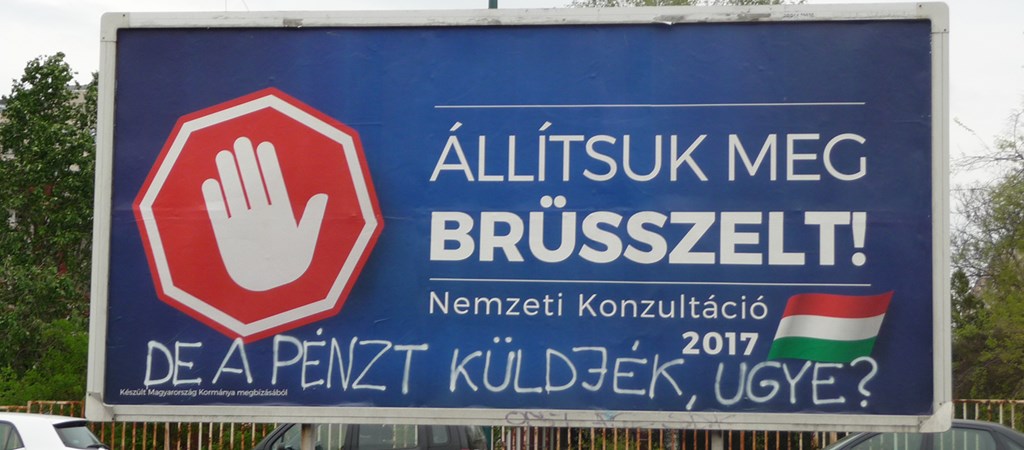The https://english.atlatszo.hu use cookies to track and profile customers such as action tags and pixel tracking on our website to assist our marketing. On our website we use technical, analytical, marketing and preference cookies. These are necessary for our site to work properly and to give us inforamation about how our site is used. See Cookies Policy
Hungary had to repay nearly HUF 20 billion due to irregularities in EU funded projects
The Operational Programme Implementation (in Hungarian: Végrehajtás Operatív Program or VOP) aimed to ensure the efficient use of EU funds in Hungary between 2007-2013 by improving the Hungarian bodies managing EU funds. The EU gave roughly HUF 92 billion for this purpose, but in the course of follow-up audits they found a number of irregularities, so the Hungarian government had to pay back roughly a quarter of the money, about HUF 20 billion.
According to information obtained by Atlatszo, the European Commission found that the use of the money for two projects involving the Prime Minister’s Office was so irregular that it asked Hungary to pay back the full amount. According to our information, the government tried to deny these findings for a while, but then accepted the repayment of the nearly HUF 20 billion.

In August 2007, the European Commission adopted Decision C/2007/3799 on the Operational Programme “Implementation” submitted by Hungary, which aimed to promote the efficient use of EU funds for Hungary in the 2007-2013 financial cycle by improving the Hungarian bodies managing EU funds (mainly the National Development Agency and the Prime Minister’s Office). For this purpose, the European Union gave roughly €370 million (about HUF 92.5 billion at the average exchange rate of 250 at the time) to Hungary.
HUF 539 million correction for public procurement irregularities
In mid-November 2015, the European Commission (EC) carried out a horizontal public procurement system audit, which included several projects financed with EU funds.
For the VOP projects concerned, the European Commission proposed financial corrections, i.e. repayments of aid totalling HUF 539 million.
One of the findings of the audit was the irregular repetition of similar works and services awarded through a negotiated procedure without prior publication of a notice, which was the case for 3 projects, where the Prime Minister’s Office was the beneficiary, and 25% of the grant was recovered by the EU. Almost nothing about these three projects can be found on the internet.
Another systemic finding identified by the 2015 audit was the unjustified shortening of deadlines, which led the European Commission to request the reimbursement of 10% of the contracts affected by the irregularity. The Hungarian government has written several letters, claiming that there were no irregularities, but finally in May 2019, they agreed to repay 539 million forints, of which 458 million was financed from EU funds.
EU has reclaimed nearly HUF 20 billion
The project VOP-1.1.1-2008-0018, which was also the subject of the European Commission’s 2015 audit, was previously investigated by the European Anti-Fraud Office (OLAF) in 2011. In their report, they found a number of irregularities.
Later, the European Commission (EC), following OLAF’s report, proposed a 25% correction for non-compliance with public procurement rules for two contracts in the project. This amounted to HUF 319.5 million, of which the EU share was HUF 271.6 million. The repayment of the amount was acknowledged by the Hungarian government in 2019. In response to a question from independent MP Ákos Hadházy, Péter Polt, the Attorney General, stated in autumn 2020 that the project had been prosecuted in August 2020 following a report by OLAF.
At the time of the project in question and during the period investigated by OLAF, the head of the Hungarian body managing EU funds, the National Development Agency, was Zoltán Petykó, whose name is reportedly mentioned in the report.
A year after the public procurement audit, the EC carried out a targeted audit of the Operational Programme “Implementation” in mid-November 2016. This included an audit on the implementation of the Single Monitoring and Information System (EMIR), under VOP 2.1.1.
The EC found such serious irregularities that it recommended the recovery of the entire amount of the grant for the establishment of EMIR. This amounted to a total of 22.2 billion forints, of which 18.8 billion was the EU share.
Two projects were concerned, VOP-2.1.1-2007-0001 and VOP-2.11.1-2008-0001, for which the Deputy State Secretariat for the Coordination of European Union Development at the Prime Minister’s Office was the beneficiary. The Hungarian government tried to refute the Commission’s findings, but finally in July 2020 they said that they would make the necessary financial corrections to close the programme.
According to 24.hu, the EU auditors’ problem with the project was that the Hungarian government illegally used the negotiated procedure without prior publication of a notice, which allows contracting authorities to negotiate directly with potential contractors. Welt 2000 Kft. was chosen to develop and operate the system, and then ownership of the system was gradually transferred to the company, which effectively eliminated competition and gave Welt 2000 Kft. a huge advantage.
After the story of 24.hu, the then head of the Prime Minister’s Office, János Lázár, filed a criminal complaint, claiming that the irregularities concerned the previous government, led by Ferenc Gyurcsány. But this is not the case: although the development really began under the Socialists, it was the Fidesz government that revived it after 2010.
How was the money paid back?
Since 2013, a government decree allows the central budget to reimburse EU funds instead of the beneficiary in case of irregularities. Most of the time, they claim that “the project is in the national interest”.
According to our information, it is precisely on this basis that the Prime Minister’s Office has requested that the central budget be used to repay the HUF 23 billion financial correction imposed in the course of the three investigations, of which the EU share is HUF 19.6 billion.
The first idea was that the government would repay this amount from the budget’s reserve allocation for EU programmes, but this failed because because the amount to be repaid exceeded the reserve for the whole year. However, there was another solution: the government decree states that “The use of appropriations containing EU funds in excess of co-financing is possible to settle claims of the European Commission against Hungary arising from irregularities in programmes and projects approved with EU funds, provided that the amount cannot be transferred to the beneficiaries”.
Since then, there is no news on who was responsible for the irregularities.
Translated by Zita Szopkó. The original, more detailed Hungarian version of this story was written by Katalin Erdélyi and is available here.
Hungary. What do you know about Hungary? from atlatszo.hu on Vimeo.

